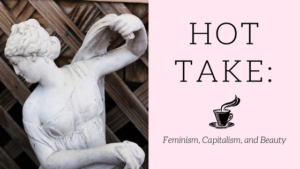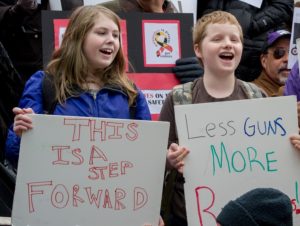The good guy on ‘The Good Place’
Chidi Anagonye portrays positive masculinity in new hit show
Chidi Anagonye (William Jackson Harper), lead character on NBC’s “The Good Place,” truly crushes gender stereotypes. This is certainly a positive development, but there is definitely room to improve.
February 25, 2018
Non-toxic behaviors? In modern television’s male characters? It’s more likely than you’d think.
Gender politics is a really strange thing that no one wants to talk about in the hyper-polarized political arena we inhabit today. That’s pretty unfortunate, especially when it comes to matters as consequential as TV. In all seriousness, what we watch matters. It shapes the way in which we think, and most importantly the way in which kids think. Gender stereotypes and tropes are often premier fodder for your everyday sitcom (the most blatant example of this probably being the cringe-fest that is the Big Bang Theory).
But the tide is beginning to shift. More and more programs are writing with nuance, depicting characters not through an archaic lens of gender roles, but through modern eyes. This doesn’t always mean perfection, since the “modern” state of gender politics is, to say the least, a bit dicey. Regardless, it’s something in the way of progress. While CBS is still making plenty of dough off their cartoonishly misogynistic geeks, we at least for a while had the nerdy niceness of Ben Wyatt on “Parks and Recreation.”
So why is this even a good thing? Why should television continue the trend of prioritizing less than archetypal masculinity? Because sometimes what’s familiar, and therefore easier for Hollywood to churn out in terms of characterization, is riddled with traits that ought to make our skin crawl. Whether it’s the objectification of women framed praiseworthy or unnecessary aggression, some of what the industry depicts as normal doesn’t have much of a purpose in terms of relaying morals or advancing a story.
Oh, and yeah — this doesn’t mean men in media can’t have flaws. There’s a difference between making overtly negative characteristics seem a-okay and writing boring characters. Remember when white feminists collectively had an aneurysm after the release of “The Last Jedi” because a male character questioned a female character’s authority when she was actively hiding critical information from him? That’s not what we’re talking about. Making characters “positively masculine” doesn’t mean men can never have conflict with women, or any conflict at all, it means moving away from unfair portrayals that harm society as a whole.
One of the best examples of non-toxic male characters in media today is Chidi Anagonye from the NBC series “The Good Place.” The show follows a group of recently deceased individuals who’ve ostensibly qualified for heaven. Ex-ethics professor Chidi (William Jackson Harper) becomes morally compelled to help bureaucratic error Eleanor Shellstrop (Kristen Bell) earn her rightful place in the Good Place (without letting it slip that she wasn’t meant to be there to begin with, of course).
Chidi then delves into teaching Eleanor about how to be a good person in a quasi-classroom within their home. Eleanor, who was categorically terrible but not necessarily evil on earth, begins to understand compassion through her relationship with him. While these big moral revelations are unfolding in the background, viewers get digestible thirty-five-minute doses of Eleanor’s crude humor and Chidi’s insatiable annoyance. To join the fun is Ted Danson as the constantly stressed architect of the “neighbourhood” Eleanor and Chidi call home within the Good Place, as well as the hyper-posh modern aristocrat Tahani (Jameela Jamil) and the devout Buddhist monk Xianyu (Manny Jacinto). Why does Chidi stand out among this colorful cast of characters?
Chidi, in his own unique way, exemplifies positive masculinity. While, like any human being, he can become frustrated and uncomfortable. He’s a hard-worker who genuinely believes in his friend to become an upstanding member of their neighbourhood. He’s the diametric opposite to a lot of “macho” traits. Where traditional men are rash and brave, Chidi is reserved, evaluating all his options. He’s a bit nervous and awkward, which are flaws that many people can actually relate to, as opposed to the more glamorized ineptitudes of men often depicted in media.
But when it counts, Chidi develops as a character and gets over his fears. As a result, the finale of the first season becomes a sort of battle of self-sacrifice, a contest of who’s more willing to lose everything for their friends. While he is indeed a non-toxic character, that doesn’t translate to being a wimp or being unable to face the hurdles the narrative throws his way.
And even so, Chidi’s less than valiant disposition isn’t the mold for positive masculinity. Many characters constitute what is seemingly a paradox too much of Hollywood. The action hero Raleigh Becket from Guillermo del Toro’s “Pacific Rim” possesses strength and willpower, and yet constantly undermines stereotypes by not performing toxic behaviors. Similarly, Randall Pearson on NBC’s “This is Us” manages to be both a competent father figure and nurturing rather than toxic. Chidi is just one vehicle of positive masculinity, not a new archetype that should be followed by all other content creators.
This isn’t about nitpicking. Media shouldn’t be barred from demonstrating toxic behaviors. It’s important for the public to understand what those behaviors look like. It’s one thing for a show or movie to demonstrate dark facets of the human psyche, and use the ideology of male superiority to do so, but it’s another to be complicit in issues that are more relevant now than ever given the culture in Hollywood that 2017 unapologetically exposed. Believe it or not, small social interactions deemed as normal and shown as such on TV, actually contribute to larger sociological issues.
It’s time to understand that masculine heroism isn’t synonymous with aggression and misogyny, and that men can act in ways traditionally attributed to women without being weak. There’s signs of change in modern media that should be wholeheartedly embraced. Role models matter — for both young girls and young boys.








